Dr. Fukaya has posted a new article on his Japanese blog.
--------------------
Atopic eczema can be the decreased patchy cortisol production in epidermis
The below picture is a dyed adrenal gland - the brown areas show that there are cortisol, which are found plenty in the cortical cytoplasm.
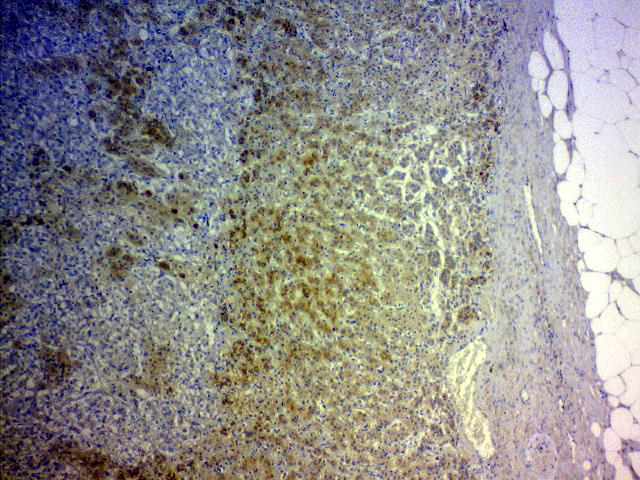
The picture below is dyed skin. Epidermis is certainly dyed, and in this case especially hair follicles are strongly tinted.
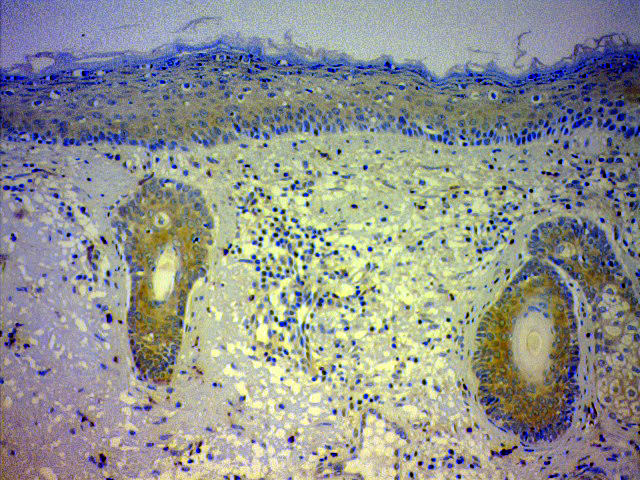
This one below is my skin. The epidermal cells are evenly dyed.
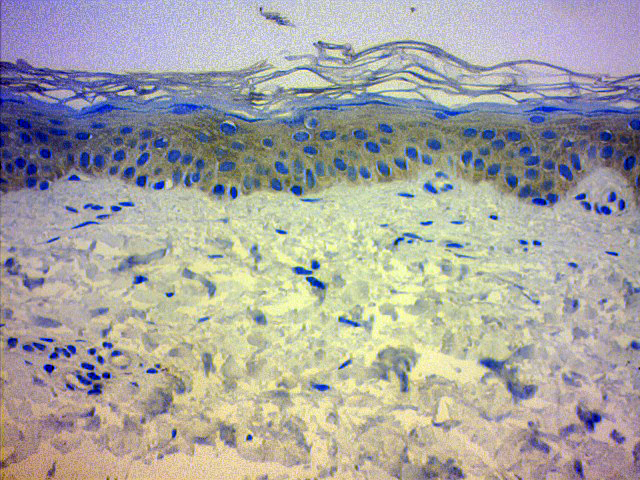
If you test on people with atopic eczema, however, some areas are not dyed at all. There are the parts where still produce steroids, but only in patches. This picture below is from a patient, who has withdrawn from topical steroids for a long time.
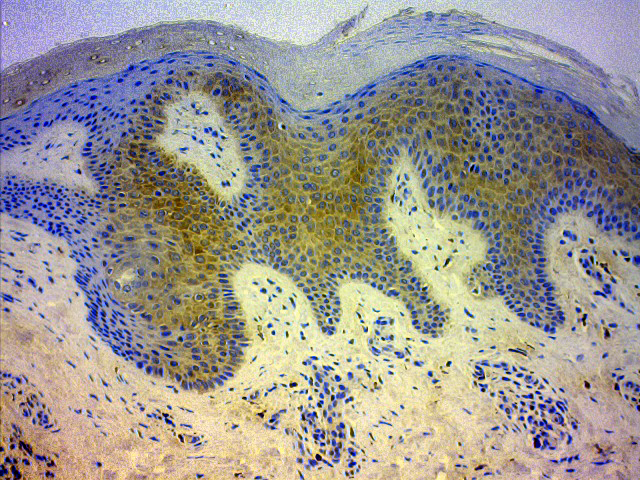 This can explain the clinical condition of atopic dermatitis.
This can explain the clinical condition of atopic dermatitis.Steroids help to make skin thin and differentiated. Therefore, when epidermis stops producing steroids, it becomes thickened. Steroids are also thought to adjust and lessen reactions to external stimulus and allergens. So, without steroids, skin inflammation increases. It results in more intense immune reaction and non-specific hypersensitive reaction.
This picture below is from a different patient, who has been using topical steroids everyday for a few years to suppress atopic dermatitis. It shows that the epidermis isn't thickened, and cortisol production isn't patchy. Topical steroids are helping to increase the cortisol level in epidermal cells. As a result, the cortisol is evenly produced, although I think that the cortisol production would be patchy without using topical steroids. This is possibly the benefit of topical steroids treatment.
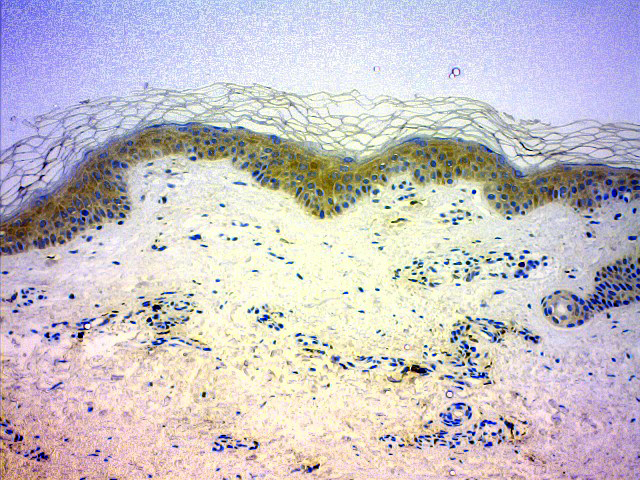
But, a different part shows the deficiency in the cortisol production as in the picture below.
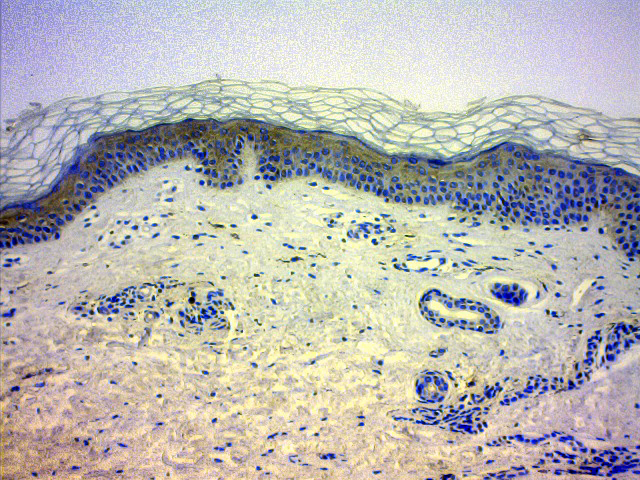
It is noteworthy that another patient showed the patchy cortisol levels when his skin was worse,
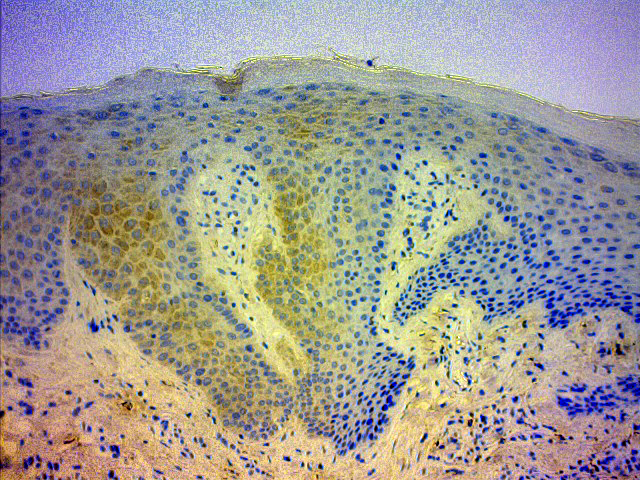
but the cortisol production becomes even when his skin was improved (supposedly natural healing, as he has not been using topical steroids).
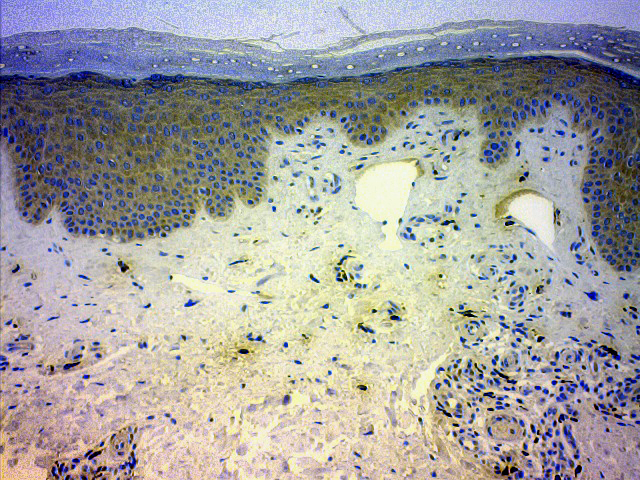 This is only my hypothesis, but from all those cases, I think:
Atopic eczema is the decreased patchy cortisol production in epidermis, therefore epidermis becomes thickened and cannot fully differentiated. Also, it cannot control external stimulus and allergens with self-produced cortisol, which results in skin inflammation.
This is only my hypothesis, but from all those cases, I think:
Atopic eczema is the decreased patchy cortisol production in epidermis, therefore epidermis becomes thickened and cannot fully differentiated. Also, it cannot control external stimulus and allergens with self-produced cortisol, which results in skin inflammation. Although topical steroids help to produce cortisol in epidermis and make skin seemingly normal, it could be the case that epidermis stops responding to topical steroids after a long term use.
When epidermis cells create more cortisol by application of topical steroids, nearby epidermis cells also respond to produce more cortisol. If epidermis stops corresponding to topical steroids, those nearby cells also function less and eczema would be worse. This can be interpreted as "rebound".
Also, the mechanism of natural healing can be the evenly produced cortisol. So-called "moisturiser withdrawal", which helps to increase the cortisol level in epidermis, may be working to make the cortisol production evenly. UVB radiation also helps to increase cortisol in epidermis, so it makes sense to use as a treatment for atopic eczema.
This hypothesis can explain various phenomana related to atopic eczema, but it is still a hypothesis. There are only a small number of cases yet and it requires further validation with testing on varied types of skin rash. --------------------
Dr. Fukaya is now looking into his hypothesis further, by calling for volunteer participants to collect more test cases in Japan. I will update when more info comes.

Hi Tommy,
ReplyDeleteFirst of all thank you for your time in responding to all the comments and providing us with updates of Dr. Fukaya's latest research. I find your posts greatly helpful because I cannot find the information anywhere else.
After reading your posts, I finally found out the biggest question of steroid usage - Acne/cyst injections is affecting my prolonged TSW. I am on month 17th, and considering I am a short TS (1 month) user of 1% hydrocortisone, and 3 rounds of low dosage oral steroids in a span of 4 months I am experiencing full body flares. Mine come in the form of nummular eczema (coin sized patches) and they do not come in form of red sleeves on arms and legs like every body else. I have red skin syndrome on face as this is the only place I had used TS on. I had barely used any TS on my body (if I did, it is 3 applications of otc 1% or 2.5% hydrocortisone, which made my patches disappear clearly). I supposed the oral steroids ruined me but still isn't enough to justify my steroid addiction.
I am in my 17 month of TSW, My first flare up (rebound) started with taking TCM and yes because of my latest usage of 1 month on and off 1% hydrocortisone, I experienced kushing syndrome. However currently I am experiencing another round of flare up on my face that is almost as severe as my first one 17months ago, red face and oozing, crusting a little. My body had the typical nummlar eczema patches on my arms, but my legs and thighs are going through a itchy goosebump stage that is taking long to subside. Usually my legs are very clear. Why after 17 months?
1. Did Dr.Sato mention that acne treatments with steroids prolong the withdrawal process significantly?
2. I plan to visit Dr. Sato in Osaka, as I have been referred to him by Dr. Fukaya. I just need an experts advice to know what stages of TSW I am in or if not, what eczema treament I need. Is there any advice or tips you can give me before I plan all this (at the end of this month)? I am definitely taking blood tests, allergy tests, steroid history and pictures to aid his understanding of my situation.
Your snapshot of the flow diagram chart on simple eczema and steroid addiction is so relieving because I have always questioned unless your "lucky" you are bound to experience a flare up or a rebound at least one time in your life whatever form of steroids you use. This was also mentioned by my TCM who specializes in cure for eczema.
Thank you for reading the message and I look forward hearing from you.
Hello there,
DeleteThank you for your comment. Glad to hear that you found my blog helpful.
To answer your questions:
1. He did say that if you used steroids for acne treatment, that can be a reason to prolong the withdrawal process.
2. If you can visit Dr. Sato, that would be great. I understand your feeling that it is difficult to judge what stage you are in the withdrawal process. I recommend you to take blood and allergy tests before you visit Dr. Sato if you can, and show the results to him on you visit. Write your skin and medical history in A4 paper and bring it with you, so that Dr. Sato can understand your situation beforehand.
Also, have you seen this post?
http://skinofrose.blogspot.com.es/2014/10/consultations-with-dr-sato-at-hannan.html
Hi Tommy,
ReplyDeleteThank you for your reply, I have been lurking on the itsan forum as well for more information. All of this is very new to me since mid June. After enduring a month and a bit of 17month tsw flare, I am recovering, but not yet fully recovered. I have seen your post on the details of the hospital at the Hannan Chuo Hospital and I have just called today to try and make an appointment. It seems that they have difficulty speaking english, if appointment works out I may have to take in a translator (do you recommend this?)
I will definately email him the medical history in A4 paper before I visit, I hope he can take me in for a consultation. I need to go there and prove to my parents that TSW is no joke or a made up theory. Its already trying to endure this process alone, but having parents pushing you to take western medication by "tapering off medication" without in-depth knowledge of exactly what eczema is and its up to date treatment options are.
Even though I am recovering I'm now currently at the end of my sanity just thinking about another flare. I sometimes think even if this whole TSW is worthwhile in the longrun to "some" people - I am afraid that the damage to the dna has been done long ago since the application/ intake of steroids so that when the body does go through withdrawal symptoms it takes a heck of body synchronizing to stop the replication of damaged cells.
Thanks for your reply and looking forward to hearing from you.
Hi there,
DeleteHave you managed to book an appointment on phone?
I don't think you need an interpreter, as I think Dr. Sato speaks English. If I remember correctly he briefly studied or worked in the US.